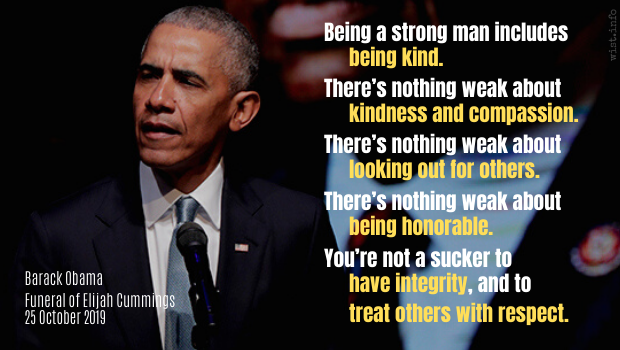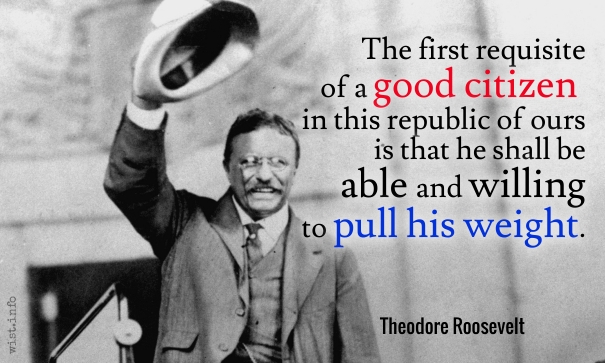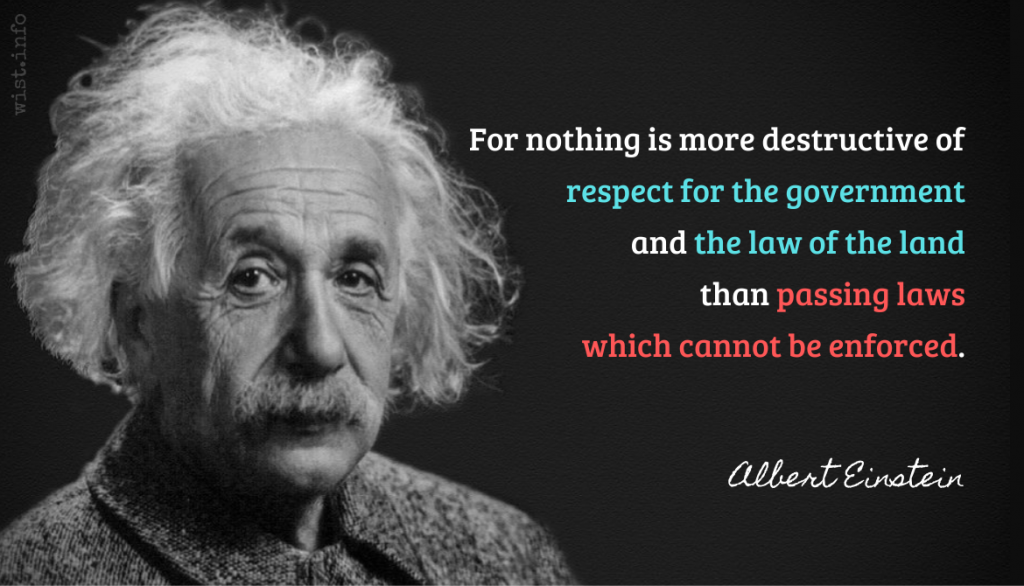And he respects Owl, because you can’t help respecting anyone who can spell TUESDAY, even if he doesn’t spell it right; but spelling isn’t everything. There are days when spelling Tuesday simply doesn’t count.
Quotations about:
respect
Note not all quotations have been tagged, so Search may find additional quotes on this topic.
If you are required by society to be polite — of course it’s a voluntary system policed only by public opinion — you run into having to have equal respect for people who are not as rich and powerful as you. More than that, because of the concept of noblesse oblige, you are required to treat them even better. So etiquette is the greatest friend of the powerless; without it, might makes right.
Judith Martin (b. 1938) American author, journalist, etiquette expert [a.k.a. Miss Manners]
“Polite Company,” interview by Hara Estroff Marano, Psychology Today (1998-03)
(Source)
I wanted to love you: you prefer
To have me as your courtier.
Well, I must follow your direction.
But goodbye, Sextus, to affection.[Vis te, Sexte, coli: volebam amare.
Parendum est tibi: quod iubes, coleris:
Sed si te colo, Sexte, non amabo.]Martial (AD c.39-c.103) Spanish Roman poet, satirist, epigrammatist [Marcus Valerius Martialis]
Epigrams [Epigrammata], Book 2, epigram 55 (2.55) (AD 86) [tr. Michie (1972)]
(Source)
"To Sextus." (Source (Latin)). Alternate translations:
I Offer Love, but thou Respect wilt have;
Take, Sextus, all thy Pride and Folly crave:
But know I can be no Man's Friend and Slave.
[tr. Sedley (1702)]
The more I honour thee, the less I love.
[tr. Johnson (c. 1755)]
Yes, I submit, my lord; you've gained your end:
I'm now your slave -- that would have been your friend;
I'll bow, I'll cringe, be supple as your glove;
-- Respect, adore you -- ev'rything but -- love.
[tr. Graves (1766)]
Sextus, would'st though courted be?
I had hopes of loving thee.
If thou wilt, I must obey;
I shall court thee, nor delay.
Dost thou ceremony seek?
And renounce my friendship? Speak.
[tr. Elphinston (1782), Book 5, ep. 35]
To love you well you bid me know you better,
And for that wish I rest your humble debtor;
But, if the simple truth I may express,
To love you better, I must know you less.
[tr. Byron (c. 1820)]
You wish to be treated with deference, Sextus: I wished to love you. I must obey you: you shall be treated with deference, as you desire. But if I treat you with deference, I shall not love you.
[tr. Bohn's Classical (1859)]
You wish to be courted, Sextus; I wished to love you. I must obey you; as you demand, you shall be courted. But if I court you, Sextus, I shall not love you.
[tr. Ker (1919)]
I offered love -- you ask for awe;
Then I'll obey you and revere;
But don't forget the ancient saw
That love will never dwell with fear.
[tr. Pott & Wright (1921)]
You want my respect, I wanted to love you,
Sextus. I give in. Have my respect.
But I cannot prefer someone I defer to.
[tr. Bovie (1970)]
You would be courted, dear, and I would love you.
But be it as you will, and I will court you.
But if I court you, dear, I will not love you.
[tr. Cunningham (1971)]
You want to be cultivated, Sextus. I wanted to love you. I must do as you say. Cultivated you shall be, as you demand. But if I cultivate you, Sextus, I shall not love you.
[tr. Shackleton Bailey (1993)]
I would love you, dear, by preference,
But you instead demand my deference.
And so my love I will defer,
With courtesy, as you prefer.
[tr. Ericsson (1995)]
You ask for deference when I offer love;
So be it; you shall have my bended knee.
But Sextus, by great Jupiter above,
Getting respect, you'll get no love from me.
[tr. Hill]
You want to be my patron and my friend.
If you insist on patron, goodbye friend!
[tr. Wills (2007)]
I wished to love you; you would have
me court you. What you want must be.
But if I court you, as you ask,
Sextus, you'll get no love from me.
[tr. McLean (2014)]
The young should have our respect. How do we know that the coming generation may not prove to be the equal of the present one?
[後生可畏、焉知來者之不如今也]
Confucius (c. 551- c. 479 BC) Chinese philosopher, sage, politician [孔夫子 (Kǒng Fūzǐ, K'ung Fu-tzu, K'ung Fu Tse), 孔子 (Kǒngzǐ, Chungni), 孔丘 (Kǒng Qiū, K'ung Ch'iu)]
The Analects [論語, 论语, Lúnyǔ], Book 9, verse 23 (9.23) (6th C. BC – AD 3rd C.) [tr. Annping Chin (2014)]
(Source)
Originally numbered by Legge as v. 22. The numbering by translator is shown below. (Source (Chinese)). Alternate translations:
A youth is to be regarded with respect. How do we know that his future will not be equal to our present?
[tr. Legge (1861), 9.22]
Reverent regard is due to youth. How know we what difference there may be in them in the future from what they are now?
[tr. Jennings (1895), 9.22]
Youths should be respected. How do we know that their future will not be as good as we are now?
[tr. Ku Hung-Ming (1898), 9.22]
The young should inspire one with respect. How do we know that their future will not equal our present?
[tr. Soothill (1910), 9.22]
You can respect ’em soon after birth, how can one know what will come up to present record?
[tr. Pound (1933), 9.22]
Respect the young. How do you know that they will not one day be all that you are now?
[tr. Waley (1938), 9.22]
Juniors are to be respected. How do we know that in future they will not be our equals?
[tr. Ware (1950), 9.23]
It is fitting that we should hold the young in awe. How do we know that the generations to come will not be the equal of the present?
[tr. Lau (1979), 9.23]
The young should be revered, for how does one know that what is to come will not be as good as the present?
[tr. Dawson (1993), 9.23]
One should regard the young with awe: how do you know that the next generation will not equal the present one?
[tr. Leys (1997), 9.23]
Young people are awe-inspiring. How do we know that in the future, they will not be so awe-inspiring as they are today?
[tr. Huang (1997), 9.23]
The next generation could be feared, how do you know the future is not better than the now.
[tr. Cai/Yu (1998), 9.23, No. 232]
The young should be held in high esteem. After all, how do we know that those yet to come will not surpass our contemporaries?
[tr. Ames/Rosemont (1998), 9.23]
The young are to be held in awe. How do we know that what is to come will not surpass the present?
[tr. Brooks/Brooks (1998), 9.23]
Hold the young in awe. How can we know their generation will not equal our own?
[tr. Hinton (1998), 9.23]
We should look upon the younger generation with awe because how are we to know that those who come after us will not prove our equals?
[tr. Slingerton (2003), 9.23]
Respect those younger than yourself. How do you know that the coming generation may not prove as good as our present one?
[tr. Watson (2007), 9.23]
We should feel threatened by young people because they might supersede us.
[tr. Li (2020), 9.23]
I’d like to write something that my peers, my colleagues, my fellow writers would find a source of respect. I think I’d rather win, for example, a Writers Guild award than almost anything on earth. And the few nominations I’ve had with the guild, and the few awards I’ve had, represented to me a far more legitimate concrete achievement than anything. Emmys, for example, most of that’s bullshit. Oscars are even worse. We have a strange, terrible affliction in this town. Everybody walks around bent-backed from slapping each other on the backs so much. It looks like arthritis but it isn’t. It’s hunger for recognition. And it’s sort of like, well, I’ll scratch you this time if you’ll scratch me next time. That kind of thing.
Rod Serling (1924-1975) American screenwriter, playwright, television producer, narrator
“Rod Serling: The Facts of Life,” interview by Linda Brevelle (4 Mar 1975)
(Source)
The purpose of violence is to force respect from other people. The less self-respect people feel, the more they are dependent on respect from others; for without a certain minimal amount of respect, from others or the self, the self begins to feel dead inside, numb and empty. That is how the most violent criminals told me they felt, and it is clear that it is the most intolerable of all feelings (though it is actually an absence of feeling, lack of the feeling of pride, or self-love). When people lack self-respect, and feel they are incapable of eliciting respect from others in the form of admiration for their achievements or their personalities, they may see no way to get respect except in the form of fear, which I think of as a kind of ersatz substitute for admiration; and violence does elicit fear, as it is intended to. For example, I have spoken to many violent criminals who spoke of how gratifying it was to see fear in the eyes of their victims.
James Gilligan (b. c. 1936) American psychiatrist and author
Preventing Violence, ch. 1 (2001)
(Source)
Between justice and respect there is this difference, that it is the part of justice not to injure; of respect, not to offend. In this the force of propriety is extremely clear.
[Est autem, quod differat in hominum ratione habenda inter iustitiam et verecundiam. Iustitiae partes sunt non violare homines, verecundiae non offendere; in quo maxime vis perspicitur decori.]
Marcus Tullius Cicero (106-43 BC) Roman orator, statesman, philosopher
De Officiis [On Duties; On Moral Duty; The Offices], Book 1, ch. 28 (1.28) / sec. 99 (44 BC) [tr. McCartney (1798)]
(Source)
Verecundia is usually translated as "modesty," but Cicero is using a more complex sense here, leading to a variety of translations. Peabody translates it as "courtesy" that is "part of or a consequence of modesty." Edmonds (at length) considers the term untranslatable here, "an inward abhorrence of moral turpitude, through which the conscience is awed, and may be said to blush."
(Source (Latin)). Alternate translations:
But here we must observe, that there is a great deal of difference between that which justice, and that which this modesty, respect, or reverence demands, in relation to other people. It is the duty of justice, not to injure or wrong any man; of respect, or reverence, not to do anything that may offend or displease him; wherein more especially the nature of that decorum we are speaking of consists.
[tr. Cockman (1699)]
But, in our estimate of human life, we are to make a difference between justice and moral susceptibility. The dictate of justice is to do no wrong; that of moral susceptibility is to give no offense to mankind, and in this the force of the graceful is most perceptible.
[tr. Edmonds (1865)]
But in the treatment of men there is a difference between justice and courtesy. It is the part of justice not to injure men; of courtesy, not to give them offence, and it is in this last that the influence of becomingness is most clearly seen.
[tr. Peabody (1883)]
In our social relations there is a difference between justice and sympathy. Not to wrong our fellow-men is the function of justice: that of sympathy is not to wound their feelings; herein the power of decorum is most conspicuous.
[tr. Gardiner (1899)]
There is, too, a difference between justice and considerateness in one's relations to one's fellow-men. It is the function of justice not to do wrong to one's fellow-men; of considerateness, not to wound their feelings; and in this the essence of propriety is best seen.
[tr. Miller (1913)]
Moreover, in maintaining distinctions among men there is a degree of difference between justice and decent respect. The duty of justice is not to do violence to men. The duty of decent respect is not to insult them; this latter especially reveals the essence of decorum.
[tr. Edinger (1974)]
Civilization is a method of living, an attitude of equal respect for all men.
Miss Manners does not subscribe to the notion that merely being present and respectful, when someone else practices their religion, is tantamount to endorsing that religion.
Judith Martin (b. 1938) American author, journalist, etiquette expert [a.k.a. Miss Manners]
Twitter (2011-12-29)
(Source)
At the Conclusion of my last Paper, I asserted that the Summary of Good Breeding was no other than that comprehensive and exalted Rule, which the greatest Authority hath told is is the Sum Total of all Religion and all Morality.
Here, however, my Readers will be pleased to observe that the subject Matter of good Breeding being only what is called Behavior, it is this only to which we are to apply it on the present Occasion. Perhaps therefore we shall be better understood if we vary the Word, and read it thus: Behave unto all Men, as you would they should be behave unto you.
This will most certainly oblige us to treat all Mankind with the utmost Civility and Respect, there being nothing which we desire more than to be treated so by them.
Henry Fielding (1707-1754) English novelist, dramatist, satirist
Covent Garden Journal, #56 (25 Jul 1752)
(Source)
Who sneers at epigrams and feigns to scout them,
Believe me, does not know a thing about them.
The real bores are the dreary epic spinners
Who rant of Tereus’ or Thyestes’ dinners,
Who rave of cunning Daedalus applying
The wings to Icarus to teach him flying,
Or else to show what dullards they esteem us
Bleat endless pastorals on Polyphemus.
My unpretentious Muse is not bombastic,
But deems these robes of Tragedy fantastic.
“Such things,” you say, “earn all men’s commendation,
As works of genius and inspiration.”
Ah, very true — those pompous classic leaders
Do get the praise — but then I get the readers![Nescit, crede mihi, quid sint epigrammata, Flacce,
Qui tantum lusus ista iocosque vocat.
Ille magis ludit, qui scribit prandia saevi
Tereos, aut cenam, crude Thyesta, tuam,
Aut puero liquidas aptantem Daedalon alas,
Pascentem Siculas aut Polyphemon ovis.
A nostris procul est omnis vesica libellis,
Musa nec insano syrmate nostra tumet.
“Illa tamen laudant omnes, mirantur, adorant.”
Confiteor: laudant illa, sed ista legunt.]Martial (AD c.39-c.103) Spanish Roman poet, satirist, epigrammatist [Marcus Valerius Martialis]
Epigrams [Epigrammata], Book 4, epigram 49 (4.49) (AD 89) [tr. Pott & Wright (1921)]
(Source)
"To Valerius Flaccus." (Source (Latin)). Alternate translations:
Flaccus thou knowest not Epigrams,
no more then babes or boyes:
Which deemst them to be nothyng els,
but sports and triflyng toyes:
He rather toyes, and sports it out,
whiche doeth in Verse recite
Fell Tereus dinner, or whiche doeth,
Thyestes supper write:
Or he whiche telles how Dedalus,
did teache his sonne to flie:
Which telleth eke of Plyphem,
the Shepheard with one eye.
From bookes of myne, are quight exempt,
all rancour, rage and gall:
No plaier in his euishe weeds,
heare prankyng see you shall:
Yet these men doe adore (thou sayest)
laude, like and love: in deed,
I graunt you sir those they do laude,
perdie but these thei reed.
[tr. Kendall (1577)]
Thou know'st not, trust me, what are Epigrams,
Flaccus, who think'st them jest and wanton games.
He wantons more, who writes what horrid meat
The plagu'd Tyestes and vex't Tereus eat,
Or Daedalus fitting is boy to fly,
Or Polyphemus' flocks in Sicily.
My booke no windy words nor turgid needes,
Nor swells my Muse with mad Cothurnall weedes.
Yet those things all men praise, admire, adore.
True; they praise those, but read these poems more.
[tr. May (1629)]
Though little know'st what epigram contains,
Who think'st it all a joke in jocund strains.
He direly jokes, who bids a Tereus dine;
Or dresses suppers like, Thyestes, thine;
Feins him who fits the boy with melting wings,
Or the sweet shepherd Polyphemus sings.
Or muse disdains by fustian to excel;
by rant to rattle, or in buskin swell.
Those strains the learn'd applaud, admire, adore.
Those they applaud, I own; but these explore.
[tr. Elphinston (1782), ep. 48]
You little know what Epigram contains,
Who deem it but a jest in jocund strains.
He rather jokes, who writes what horrid meat
The plagued Thyestes and vex't Tereus eat;
Or tells who robed the boy with melting wings;
Or of the shepherd Polyphemus sings.
Our muse disdains by fustian to excel,
By rant to rattle, or in buskins swell.
Though turgid themes all men admire, adore,
Be well assured they read my poems more.
[Westminster Review (Apr 1853)]
He knows not, Flaccus, believe me, what Epigrams really are,
who calls them mere trifles and frivolities.
He is much more frivolous, who writes of the feast of the cruel
Tereus; or the banquet of the unnatural Thyestes;
or of Daedalus fitting melting wings to his son's body;
or of Polyphemus feeding his Sicilian flocks.
From my effusions all tumid ranting is excluded;
nor does my Muse swell with the mad garment of Tragedy.
"But everything written in such a style is praised, admired, and adored by all."
I admit it. Things in that style are praised; but mine are read.
[tr. Bohn's Classical (1859)]
He does not know, believe me, what epigrams are, Flaccus,
who styles them only frivolities and quips.
He is more frivolous who writes of the meal of savage
Tereus, or of thy banquet, dyspeptic Thyestes,
or of Daedalus fitting to his son melting wings,
or of Polyphemus pasturing Sicilian sheep.
Far from poems of mine is all turgescence,
nor does my Muse swell with frenzied tragic train.
"Yet all men praise those tragedies, admire, worship them."
I grant it: those they praise, but they read the others.
[tr. Ker (1919)]
What makes an epigram he knows not best
Who deems it, Flaccus, but an idle jest.
They rather jest, who Tereus' crime indict
Or the foul banquet of Thyestes write,
Or Icarus equipped with waxen wing
Or Polyphemus and his shepherding.
No fustian ornaments my page abuse
Nor struts in senseless pomp my tragic Muse.
"Men praise," you say, "and call such verse divine."
Yes, they may praise it, but they study mine.
[tr. Francis & Tatum (1924), #188, "A Defence of Epigram"]
He does not know what epigrams
Are really meant to be
Who calls them only jests and jokes
Or comic poetry --
A dimwit dilettante's delight,
Mere vers de societé
He really is the one who jests
Who writes about the stew
Served Tereus, or that loathsome meal
Of children served to you,
Thyestes, indigestion-prone,
Of sons your brother slew.
Or Daedalus fitting Icarus
With two liquescent wings,
Or who of Polyphemus tending
Sheep in Sicily sings,
And those huge, monstrous boulders which
He at Ulysses flings.
Far from my verse is any trace
Of rank turgidity.
My Muse has never donned the robes
Of pompous tragedy.
"But that's what's praised!" But what is read?
My earthy poetry!
[tr. Marcellino (1968)]
To say that epigrams are only jokes and gags
is not to know what they are, my good friend Flaccus.
The poet is more entertaining who asks you to dine
at the cannibal board of Tereus, or describes,
oh indigestible Thyestes, your dinner party;
or the diverting poet turns your attention away
to the mythical sight of Daedalus, fittingly typed
as the one who tailored those tender wings for his son;
or wanders off with Polyphemus, the pastoral giant
pasturing preposterous sheep. Far be it from me
to enlarge on the standard rhetorical situation
and wax eloquent in the interests of inflation.
Our Muse makes no use of the billowing robes
that stalk the figures of Tragedy. "But those poems
are what everyone praises and adores."
I admit it, they praise them, but they read ours.
[tr. Bovie (1970)]
Who deem epigrams mere trifles,
Flaccus, know not epigram.
He trifles who describes the meal
wild Tereus, rude Thyestes ate,
The Cretan Glider moulting wax,
the one-eyed shepherd herding sheep.
Foreign to my verse the tragic sock,
it's turgid, ranting rhetoric.
"Men praise -- esteem -- revere these works."
True: them they praise ... while reading me.
[tr. Whigham (1987)]
Anybody who calls them just frivolities and jests, Flaccus, doesn't know what epigrams are, believe me. More frivolous is the poet who writes about the meal of savage Tereus or your dinner, dyspeptic Thyestes, or Daedalus fitting his boy with liquid wings, or Polyphemus feeding Sicilian sheep. All bombast is far from my little books, neither does my Muse swell with tragedy's fantastic robe. "And yet all the world praises such things and admires and marvels." I admit it: that they praise, but this they read.
[tr. Shackleton Bailey (1993)]
Quite clueless, Flaccus, all these sorry folks
Who brand short poems mere badinage and jokes.
Want to know who's more idle? The big boys,
Our Epic Poets, who rehearse the joys
Of serving human flesh up à la carte --
Tereus' bloody banquet or the huge tart
Chez Thyestes ("It's a little gristly!").
Or they serve us crap, like how remissly
Daedalus made -- with wax, imagine! -- wings
For his poor doomed son. Then Big Epic sings
Of arms and the -- not "man" -- one-eyed giant?
Polyphemus: his brain was far from pliant,
So Homer made him watch sheep in Sicily.
Pardon me for carping so pissily,
Flaccus, at insults to my epigrams,
So far from the bloated whimsy that crams
Our big-assed epics. All men blare in praise
of these "classics," you say, and bask in their rays.
I will not disagree, but mark my word:
Some day, far off, a wise man will be heard
To say, "Classics we all want to have read,
Never to read." My books get read instead!
[tr. Schmidgall (2001)]
You think my epigrams are silly?
Far worse is bombast uttered shrilly --
Like Tereus baking human pie.
Or Daedal son who tried to fly.
Monster Cyclopes keeping sheep.
My verse is of such nonsense free.
It poses not as tragedy.
But praise for those things does exceed?
Those things men praise -- but mine they read.
[tr. Wills (2007)]
One doesn't fathom epigrams, believe me,
Flaccus, who labels them mere jokes and play.
He's trifling who writes of savage Tereus' mean
or yours, queasy Thyestes, or the way
Daedalus fit his boy with melting wings
or Polyphemus grazed Sicilian flocks.
My little books shun bombast and my Muse
won't rave in puffed-up tragedy's long frocks.
"Yet all admire, praise, honor those," Indeed,
they praise those, I confess, but these they read.
[tr. McLean (2014)]
Trust me, Flaccus, anyone who says it's just "ditties" and "jokes"
doesn't know what epigram is.
The real joker is the poet who describes the feast of cruel
Tereus, or the dinner that gave Thyestes indigestion,
or Daedalus strapping melting wings to his son,
or Polyphemus pasturing his Sicilian sheep.
No puffery gets near my little books;
my Muse doesn't swell and strut in the trailing robe of Tragedy.
"But that stuff gets the applause, the awe, the worship."
I can't deny it: that stuff does get the applause. But my stuff gets read.
[tr. Nisbet (2015)]
Shame is not of his soul; nor understood,
The greatest evil and the greatest good.[οὐδέ οἱ αἰδὼς
γίγνεται, ἥ τ᾽ ἄνδρας μέγα σίνεται ἠδ᾽ ὀνίνησι.]Homer (fl. 7th-8th C. BC) Greek author
The Iliad [Ἰλιάς], Book 24, l. 44ff (24.44) [Apollo] (c. 750 BC) [tr. Pope (1715-20)]
(Source)
Speaking of Achilles' mistreatment of Hector's corpse. Pope footnotes: "This is obscure. The original is, 'He has no shame, shame which harms men much, and profits them much.' Dr. Leat, following an ancient critic, thinks the passage an interpolation."
Alternate translations:
And shame, a quality
Of so much weight, that both it helps and hurts excessively
Men in their manners, is not known, nor hath the pow’r to be,
In this man’s being.
[tr. Chapman (1611), l. 47ff]
Shame, man’s blessing or his curse.
[tr. Cowper (1791), l. 58]
Cowper footnotes: "His blessing, if he is properly influenced by it; his curse in its consequences if he is deaf to its dictates."
Nor in him is there sense of shame, which greatly hurts and profits men.
[tr. Buckley (1860)]
Conscience, arbiter of good and ill.
[tr. Derby (1864)]
Neither hath he shame, that doth both harm and profit men greatly.
[tr. Leaf/Lang/Myers (1891)]
That conscience which at once so greatly banes yet greatly boons him that will heed it.
[tr. Butler (1898)]
Neither is shame in his heart, the which harmeth men greatly and profiteth them withal.
[tr. Murray (1924)]
There is not in him any shame; which does much harm to men but profits them also.
[tr. Lattimore (1951)]
He has no shame -- that gift that hinders mortals but helps them, too.
[tr. Fitzgerald (1974)]
No shame in the man,
shame that does great harm or drives men on to good.
[tr. Fagles (1990), l. 52ff]
Shame and respect no
longer he has, which harm men greatly but profit them also.
[tr. Merrill (2007)]
However fiercely opposed one may be to the present order, an old respect for the idea of order itself often prevents people from distinguishing between order and those who stand for order, and leads them in practise to respect individuals under the pretext of respecting order itself.
Antonin Artaud (1896-1948) French playwright, actor, director
Letter to André Gide (10 Feb 1935)
(Source)
Fine, Haemon.
That’s how you ought to feel within your heart,
subordinate to your father’s will in every way.
That’s what a man prays for: to produce good sons —
a household full of them, dutiful and attentive,
so they can pay his enemy back with interest
and match the respect their father shows his friend.
But the man who rears a brood of useless children,
what has he brought into the world, I ask you?
Nothing but trouble for himself, and mockery
from his enemies laughing in his face.[οὕτω γάρ, ὦ παῖ, χρὴ διὰ στέρνων ἔχειν,
γνώμης πατρῴας πάντ᾽ ὄπισθεν ἑστάναι.
τούτου γὰρ οὕνεκ᾽ ἄνδρες εὔχονται γονὰς
κατηκόους φύσαντες ἐν δόμοις ἔχειν,
ὡς καὶ τὸν ἐχθρὸν ἀνταμύνωνται κακοῖς
καὶ τὸν φίλον τιμῶσιν ἐξ ἴσου πατρί.
ὅστις δ᾽ ἀνωφέλητα φιτύει τέκνα,
τί τόνδ᾽ ἂν εἴποις ἄλλο πλὴν αὑτῷ πόνους
φῦσαι, πολὺν δὲ τοῖσιν ἐχθροῖσιν γέλων]Sophocles (496-406 BC) Greek tragic playwright
Antigone, l. 639 ff (Act 3) [Creon] (441 BC) [tr. Fagles (1982), l. 712ff]
(Source)
Original Greek. Alt. trans.:
Well spoken: so right-minded sons should feel,
In all deferring to a father's will.
For 'tis the hope of parents they may rear
A brood of sons submissive, keen to avenge
Their father's wrongs, and count his friends their own.
But who begets unprofitable sons,
He verily breeds trouble for himself,
And for his foes much laughter.
[tr. Storr (1859)]
That, O my son! should be thy constant mind,
In all to bend thee to thy father's will.
Therefore men pray to have around their hearths
Obedient offspring, to requite their foes
With harm, and honour whom their father loves;
But he whose issue proves unprofitable,
Begets what else but sorrow to himself
And store of laughter to his enemies?
[tr. Campbell (1873)]
Yes, my son, this is the spirit you should maintain in your heart -- to stand behind your father's will in all things. It is for this that men pray: to sire and raise in their homes children who are obedient, that they may requite their father's enemy with evil and honor his friend, just as their father does. But the man who begets unhelpful children -- what would you say that he has sown except miseries for himself and abundant exultation for his enemies?
[tr. Jebb (1891), l. 640ff]
Yea, this, my son, should be thy heart's fixed law, -- in all things to obey thy father's will. 'Tis for this that men pray to see dutiful children grow up around them in their homes, -- that such may requite their father's foe with evil, and honour, as their father doth, his friend. But he who begets unprofitable children -- what shall we say that he hath sown, but troubles for himself, and much triumph for his foes?
[tr. Jebb (1917)]
Good. That is the way to behave: subordinate
Everything else, my son, to your father’s will
This is what a man prays for, that he may get
Sons attentive and dutiful in his house,
Each one hating his father’s enemies,
Honoring his father’s friends. But if his sons
Fail him, if they turn out unprofitably,
What has he fathered but trouble for himself
And amusement for the malicious?
[tr. Fitts/Fitzgerald (1939), l. 503ff]
Rightly said.
Your father’s will should have your heart’s first place.
Only for this do fathers pray for sons
Obedient, loyal, ready to strike down
Their father’s foes, and love their father’s friends.
To be the father of unprofitable sons
Is to be the father of sorrows, a laughingstock
To all one’s enemies.
[tr. Watling (1947), l. 540ff]
And that’s how it should always be, my son! Everything should give way to a father’s wish because that’s why a father hopes to have many children: so that they can inflict upon his enemies whatever hard punishment they can and treat his friends with the same honour as he does. Whereas the father who brings to the world worthless children, well, how would that be different to having brought about the birth of innumerable pains and cause for his enemies to ridicule him?
[tr. Theodoridis (2004)]
Indeed, my son,
that’s how your heart should always be resolved,
to stand behind your father’s judgment
on every issue. That’s what men pray for --
obedient children growing up at home
who will pay back their father’s enemies,
evil to them for evil done to him,
while honouring his friends as much as he does.
A man who fathers useless children --
what can one say of him except he’s bred
troubles for himself, and much to laugh at
for those who fight against him?
[tr. Johnston (2005), l. 724ff]
There's a good boy. So should you hold at heart
and stand behind your father all the way.
It is for this men pray they may beget
households of dutiful obedient sons,
who share alike in punishing enemies,
and give due honor to their father's friends.
Whoever breeds a child that will not help
what has he sown but trouble for himself,
and for his enemies laughter full and free?
[tr. Wyckoff (1954)]
Yes, you should always be disposed this way in your breast, boy,
to assume your post behind your father’s judgments
in all things. For this reason, men pray to beget
and have sons in their households who listen,
that they may both repay an enemy with evils
and honor the philos equally with the father.
Whoever produces useless children,
what could you say about him except that he begets
hardship for himself and great mockery for his enemies.
[tr. Tyrell/Bennett (2002)]
There is a raging tiger inside every man whom God put on this earth. Every man worthy of the respect of his children spends his life building inside himself a cage to pen that tiger in.
Murray Kempton (1917-1997) American journalist.
America Comes of Middle Age: Columns, 1950-1962 (1963)
(Source)
I must respekt thoze, I suppose, who never make enny blunders, but I don’t luv them.
[I must respect those, I suppose, who never make any blunders, but I don’t love them.]
Josh Billings (1818-1885) American humorist, aphorist [pseud. of Henry Wheeler Shaw]
Everybody’s Friend, Or; Josh Billing’s Encyclopedia and Proverbial Philosophy of Wit and Humor, “Affurisms” (1874)
(Source)
JUST DISCOURSE: Do not bandy words with your father, nor treat him as a dotard, nor reproach the old man, who has cherished you, with his age.
Aristophanes (c. 450-c. 388 BC) Athenian comedic playwright
Clouds, ll. 998-999 (423 BC) [tr. Athenian Soc. (1912)]
(Source)
Alt. trans.:
- JUST ΛΟΓΟΣ: "[Learn] not to contradict your father in any thing; nor by calling him Iapetus, to reproach him with the ills of age, by which you were reared in your infancy." [tr. Hickie (1853)]
- RIGHT LOGIC: "Nor dare to reply when your Father is nigh, nor 'musty old Japhet' to call / In your malice and rage that Sacred Old Age which lovingly cherished your youth." [tr. Rogers (1924)]
The only man for whom Hitler had “unqualified respect” was “Stalin the genius,” and while in the case of Stalin and the Russian regime we do not have (and presumably never will have) the rich documentary material that is available for Germany, we nevertheless know since Khrushchev’s speech before the Twentieth Party Congress that Stalin trusted only one man and that was Hitler.
Hannah Arendt (1906-1975) German-American philosopher, political theorist
The Origins of Totalitarianism, Part 3, ch. 10 “A Classless Society,” sec. 1 (1951)
(Source)
I was thinking I’d want my daughters to know how much I love them, but I’d also want them to know that being a strong man includes being kind. That there’s nothing weak about kindness and compassion. There’s nothing weak about looking out for others. There’s nothing weak about being honorable. You’re not a sucker to have integrity, and to treat others with respect.
Barack Obama (b. 1961) American politician, US President (2009-2017)
Speech, Funeral of Elijah Cummings, Washington, DC (25 Oct 2019)
(Source)
Always struck by the “comical” aspect of everything in Algeria connected with death. I find nothing more justified. Impossible to exaggerate the ridiculous quality of an event that is normally accompanied by sweat and gurgling. Similarly, it could not be too far demoted from the sacred status normally attributed to it. Nothing is more despicable than respect based on fear. And from this point of view, death is no more worthy of respect than Nero or the inspector at my local police station.
Albert Camus (1913-1960) Algerian-French novelist, essayist, playwright
Notebooks: 1935-1942, Notebook 3, Nov 1939 [tr. Thody (1963)]
(Source)
It is striking how much more seriously we are likely to be taken after we have been dead a few centuries.
Alain de Botton (b. 1969) Swiss-British author
The Consolations of Philosophy, ch. 4 “Consolation for Inadequacy” (2000)
(Source)
We are justified in enforcing good morals, for they belong to all mankind; but we are not justified in enforcing good manners, for good manners always mean our own manners.
Gilbert Keith Chesterton (1874-1936) English journalist and writer
All Things Considered, “Limericks and Counsels of Perfection” (1908)
(Source)
Never trample on any soul though it may be lying in the veriest mire; for that last spark of self-respect is its only hope, its only chance; the last seed of a new and better life: — the voice of God that whispers to it: “You are not what you ought to be, and you are not what you can be. You are still God’s child, still an immortal soul. You may rise yet, and fight a good fight yet, and be a man once more, after the likeness of God who made you, and Christ who died for you!”
Charles Kingsley (1819-1875) English clergyman, historian, essayist, novelist (pseud. "Parson Lot")
Good News of God, Sermon 33 “The Friend of Sinners [Mark 2:15-16]” (1859)
(Source)
[Dr. John] Campbell is a good man, a pious man. I am afraid he has not been in the inside of a church for many years; but he never passes a church without
pulling off his hat. This shews that he has good principles.
The surest way to corrupt a youth is to instruct him to hold in higher esteem those who think alike than those who think differently.
The first requisite of a good citizen in this republic of ours is that he shall be able and willing to pull his weight; that he shall not be a mere passenger, but shall do his share in the work that each generation of us finds ready to hand; and, furthermore, that in doing his work he shall show, not only the capacity for sturdy self-help, but also self-respecting regard for the rights of others.
He who is mistaken in an action which he sincerely believes to be right may be an enemy, but retains our esteem.
[Celui qui se trompe dans une intention qu’il croit bonne, on peut le combattre, on ne cesse pas de l’estimer.]
Jules Verne (1828-1905) French novelist, poet, playwright
The Mysterious Island, Part 3, ch. 16 (1874)
(Source)
Many men and many women enjoy popular esteem, not because they are known, but because they are not.
Nicolas Chamfort (1741-1794) French writer, epigrammist (b. Nicolas-Sébastien Roch)
(Attributed)
(Source)
Attributed in Maturin M. Ballou, Notable Thoughts About Women, #3144 (1882).
You will find that he takes care never to say or do anything, that can be construed into a slight, or a negligence; or that can, in any degree, mortify people’s vanity and self-love; on the contrary, you will perceive that he makes people pleased with him by making them first pleased with themselves: he shows respect, regard, esteem and attention, where they are severally proper: he sows them with care, and he reaps them in plenty.
Lord Chesterfield (1694-1773) English statesman, wit [Philip Dormer Stanhope]
Letter to his son, #214 (18 Jan 1750)
(Source)
On a proper role model to imitate.
I also give it in charge to you to avoid all disrespect of the religion of the country, and its ceremonies. Prudence, policy, and a true Christian spirit, will lead us to look wit compassion up their errors without insulting them. While we are contending for our own liberty, we should be very cautious not to violate the rights of conscience in others, ever considering that God alone is the judge of the hearts of men, and to him only in this case are they answerable.
George Washington (1732-1799) American military leader, Founding Father, US President (1789-1797)
“Charge to the Northern Expeditionary Force,” letter to Benedict Arnold (14 Sep 1775)
(Source)
Regarding the invasion of (Catholic) Quebec, Canada.
INARA: What did I say to you about barging into my shuttle?
MAL: That it was manly and impulsive?
INARA: Yes, precisely. Only the exact phrase I used was, “Don’t.”
The crime of book purging is that it involves a rejection of the word. For the word is never absolute truth, but only man’s frail and human effort to approach the truth. To reject the word is to reject the human search.
The only thing I really can’t tolerate is intolerance. I’m a fuzzy-headed warm-hearted liberal, and I think fuzzy-headed warm-hearted liberalism is an ideological stance that needs defending — if necessary, with a hob-nailed boot-kick to the bollocks of budding totalitarianism. Mutual respect and tolerance is great, but it doesn’t work without the mutuality.
Charles "Charlie" Stross (b. 1964) British writer
“Multiculturalism or Liberalism?” Charlie’s Blog (30 May 2002)
(Source)
I never make the mistake of arguing with people for whose opinions I have no respect.
Edward Gibbon (1737-1794) English historian
(Attributed)
Courage is a quality so necessary for maintaining virtue that it is always respected, even when it is associated with vice.
Samuel Johnson (1709-1784) English writer, lexicographer, critic
Comment (11 Jun 1784)
(Source)
In James Boswell, The Life of Samuel Johnson (1791)
The best thing to give to your enemy is forgiveness; to an opponent, tolerance; to a friend, your heart; to your child, a good example; to a father, deference; to your mother, conduct that will make her proud of you; to yourself, respect; to all men, charity.
Clara Lucas Balfour (1808-1878) English novelist, lecturer, temperance campaigner
Sunbeams for All Seasons: Counsels, Cautions, and Precepts (1861 ed.)
My political view is democracy. Everyone should be respected as an individual, but no one idolized.
To be capable of respect is, in these days, almost as rare as to be worthy of it.
[Être capable de respect est aujourd’hui presque aussi rare qu’en être digne.]
Joseph Joubert (1754-1824) French moralist, philosopher, essayist, poet
Pensées [Thoughts], ch. 18 “Du Siècle [On the Age],” ¶ 38 (1850 ed.) [tr. Calvert (1866), ch. 13]
(Source)
(Source (French)). Alternate translations:
To be capable of respect is well-night as rare at the present day as to be worthy of it.
[tr. Attwell (1896), ¶ 247]
To be capable of respect is almost as rare in these days as to be worthy of it.
[tr. Lyttelton (1899), ch. 17, ¶ 15]
Respectfulness, without the rules of propriety, becomes laborious bustle; carefulness, without the rules of propriety, becomes timidity; boldness, without the rules of propriety, becomes insubordination; straightforwardness, without the rules of propriety, becomes rudeness.
[恭而無禮則勞、愼而無禮則葸、勇而無禮則亂、直而無禮則絞。]
Confucius (c. 551- c. 479 BC) Chinese philosopher, sage, politician [孔夫子 (Kǒng Fūzǐ, K'ung Fu-tzu, K'ung Fu Tse), 孔子 (Kǒngzǐ, Chungni), 孔丘 (Kǒng Qiū, K'ung Ch'iu)]
The Analects [論語, 论语, Lúnyǔ], Book 8, verse 2 (8.2.1) (6th C. BC – AD 3rd C.) [tr. Legge (1861)]
(Source)
(Source (Chinese)). Brooks (below) believes this text was interpolated into Book 8 at the time that Book 14 was collected. Alternate translations:
Without the Proprieties, we have these results: for deferential demeanour, a worried one; for calm attentiveness, awkward bashfulness; for manly conduct, disorderliness; for straightforwardness, perversity.
[tr. Jennings (1895)]
Earnestness without judgment becomes pedantry; caution without judgment becomes timidity; courage without judgment leads to crime; uprightness without judgment makes men tyrannical.
[tr. Ku Hung-Ming (1898)]
Courtesy uncontrolled by the laws of good taste becomes labored effort, caution uncontrolled becomes timidity, boldness uncontrolled becomes recklessness, and frankness uncontrolled become effrontery.
[tr. Soothill (1910)]
Respect without rules of procedure becomes laborious fuss: scrupulosity without rules of procedure, timidity (fear to show the thought); boldness without such rules breeds confusion; directness without rules of procedure becomes rude.
[tr. Pound (1933)]
Courtesy not bounded by the prescriptions of ritual becomes tiresome. Caution not bounded by the prescriptions of ritual becomes timidity, daring becomes turbulence, inflexibility becomes harshness.
[tr. Waley (1938)]
Not to follow the rites in being modest is annoyance. Not to follow them in exercising care is timidity. Not to follow them in acts of bravery is confusion. Not to follow them in our uprightness is brusqueness.
[tr. Ware (1950)]
Unless a man has the spirit of the rites, in being respectful he will wear himself out, in being careful he will become timid, in having courage he will become unruly, and in being forthright he will become intolerant.
[tr. Lau (1979)]
If one is courteous but does without ritual, then one dissipates one's energies; if one is cautious but does without ritual, then one becomes timid; if one is bold but does without ritual, then one becomes reckless; if one is forthright but does without ritual, then one becomes rude.
[tr. Dawson (1993)]
Without ritual, courtesy is tiresome; without ritual, prudence is timid; without ritual, bravery is quarrelsome; without ritual, frankness is hurtful.
[tr. Leys (1997)]
Respectfulness without the rituals becomes laboriousness; discretion without the rituals becomes apprehensiveness; courage without the rituals becomes rebelliousness; straightforwardness without the rituals becomes impetuosity.
[tr. Huang (1997)]
One would be tired if one is humble but not polite; One would be week if one is cautious but not polite; One would be foolhardy if one is brave but not polite; One would be caustic if one is frank but not polite.
[tr. Cai/Yu (1998), #190]
Deference unmediated by observing ritual propriety [li] is lethargy; caution unmediated by observing ritual propriety is timidity; boldness unmediated by observing ritual propriety is rowdiness; candor unmediated by observing ritual propriety is rudeness.
[tr. Ames/Rosemont (1998)]
If he is respectful without propriety, he becomes wearisome. If he is careful without propriety, he becomes finicky. If he is brave without propriety, he becomes disruptive. If he is upright without propriety, he becomes censorious.
[tr. Brooks/Brooks (1998)]
Reverence becomes tedium without Ritual, and caution becomes timidity. Without Ritual, courage becomes recklessness, and truth becomes intolerance.
[tr. Hinton (1998)]
If you are respectful but lack ritual you will become exasperating; if you are careful but lack ritual you will become timid; if you are courageous but lack ritual you will become unruly; and if you are upright but lack ritual you will become inflexible.
[tr. Slingerland (2003)]
Courtesy without ritual becomes labored; caution without ritual becomes timidity; daring without ritual becomes riotousness; directness without ritual becomes obtrusiveness.
[tr. Watson (2007)]
Unless a man acts according to the spirit of the rites, in being respectful, he will tire himself out; in being cautious, he will become timid; in being brave, he will become unruly; in being forthright, he will become derisive.
[tr. Chin (2014)]
I have always been fond of the West African proverb “Speak softly and carry a big stick; you will go far.”
Theodore Roosevelt (1858-1919) American politician, statesman, conservationist, writer, US President (1901-1909)
Letter to Henry L. Sprague (26 Jan 1900)
Full text. This is the first known use by Roosevelt of his future catch phrase. It attained more fame when he used it in a speech at the Minnesota State Fair (2 Sep 1901) (there are transcript variants):
More discussion here:
- "There is a homely adage which runs 'Speak softly and carry a big stick; you will go far.' If the American nation will speak softly and yet build and keep at a pitch of highest training a thoroughly efficient Navy, the Monroe Doctrine will go far."
- "Right here let me make as vigorous a plea as I know how in favor of saying nothing that we do not mean, and of acting without hesitation up to whatever we say. A good many of you are probably acquainted with the old proverb, 'Speak softly and carry a big stick -- you will go far.' If a man continually blusters, if he lacks civility, a big stick will not save him from trouble, and neither will speaking softly avail, if back of the softness there does not lie strength, power. In private life there are few beings more obnoxious than the man who is always loudly boasting, and if the boaster is not prepared to back up his words, his position becomes absolutely contemptible. So it is with the nation. It is both foolish and undignified to indulge in undue self-glorification, and, above all, in loose-tongued denunciation of other peoples. Whenever on any point we come in contact with a foreign power, I hope that we shall always strive to speak courteously and respectfully of that foreign power."
Great merit, or great failings, will make you be respected or despised; but trifles, little attentions, mere nothings, either done or neglected, will make you either liked or disliked, in the general run of the world.
Lord Chesterfield (1694-1773) English statesman, wit [Philip Dormer Stanhope]
Letter to his son, #187 (20 Jul 1749)
(Source)
The firmness with which the people have withstood the late abuses of the press, the discernment they have manifested between truth and falsehood, show that they may safely be trusted to hear everything true and false, and to form a correct judgment between them. As little is it necessary to impose on their senses, or dazzle their minds by pomp, splendor, or forms. Instead of this artificial, how much surer is that real respect, which results from the use of their reason, and the habit of bringing everything to the test of common sense.
Thomas Jefferson (1743-1826) American political philosopher, polymath, statesman, US President (1801-09)
Letter to John Tyler (28 Jun 1804)
(Source)
I think it behooves us to treat our characters’ beliefs with some measure of respect, whatever he believes in. I mean I’m an atheist myself, but I don’t have to believe in Minbari to write about Minbari. I think if that person is a religious character, then you have to treat them with integrity and deal with them properly.
J. Michael (Joe) Straczynski (b. 1954) American screenwriter, producer, author [a/k/a "JMS"]
Panel Discussion, MIT, Cambridge, Massachusetts (4 May 1998)
(Source)
I believe that appreciation is a holy thing, that when we look for what’s best in the person we happen to be with at the moment, we’re doing what God does; so in appreciating our neighbor, we’re participating in something truly sacred.
Fred Rogers (1928-2003) American educator, minister, songwriter, television host ["Mister Rogers"]
Commencement Address, Marquette College (May 2001)
(Source)
Rogers used the same comment at the Middlebury College commencement.
The whiter my hair becomes, the more ready people are to believe what I say.
Bertrand Russell (1872-1970) English mathematician and philosopher
Interview by Woodrow Wyatt, BBC TV (1959)
Collected in Bertrand Russell's BBC Interviews (1959) [UK] and Bertrand Russell Speaks His Mind (1960) [US]. Reprinted (abridged) in The Humanist (1982-11/12), and in Russell Society News, #37 (1983-02).
Even if we think religion insoluble, we cannot think it irrelevant. Even if we ourselves have no view of the ultimate verities, we must feel that wherever such a view exists in a man it must be more important than anything else in him.
Robert Green Ingersoll (1833-1899) American lawyer, agnostic, orator
“Heretics and Heresies” (1874)
(Source)
The prestige of government has undoubtedly been lowered considerably by the prohibition law. For nothing is more destructive of respect for the government and the law of the land than passing laws which cannot be enforced. It is an open secret that the dangerous increase of crime in the United States is closely connected with this.
Albert Einstein (1879-1955) German-American physicist
“My First Impression of the U.S.A.” (1921)
(Source)
Later published as "Some Notes on my American Impressions" in The World As I See It (1949)
At Cambridge University I was taught a laudable method of argument: you never personalise, but you have absolutely no respect for people’s opinions. You are never rude to the person, but you can be savagely rude about what the person thinks. That seems to me a crucial distinction: people must be protected from discrimination by virtue of their race, but you cannot ring-fence their ideas. The moment you say that any idea system is sacred, whether it’s a religious belief system or a secular ideology, the moment you declare a set of ideas to be immune from criticism, satire, derision, or contempt, freedom of thought becomes impossible.
Salman Rushdie (b. 1947) Indian novelist
“Do we have to fight the battle for the Enlightenment all over again?” The Independent (22 Jan 2005)
(Source)
My atheism, like that of Spinoza, is true piety towards the Universe and denies only gods fashioned by men in their own image to be servants of their own human interests.























































